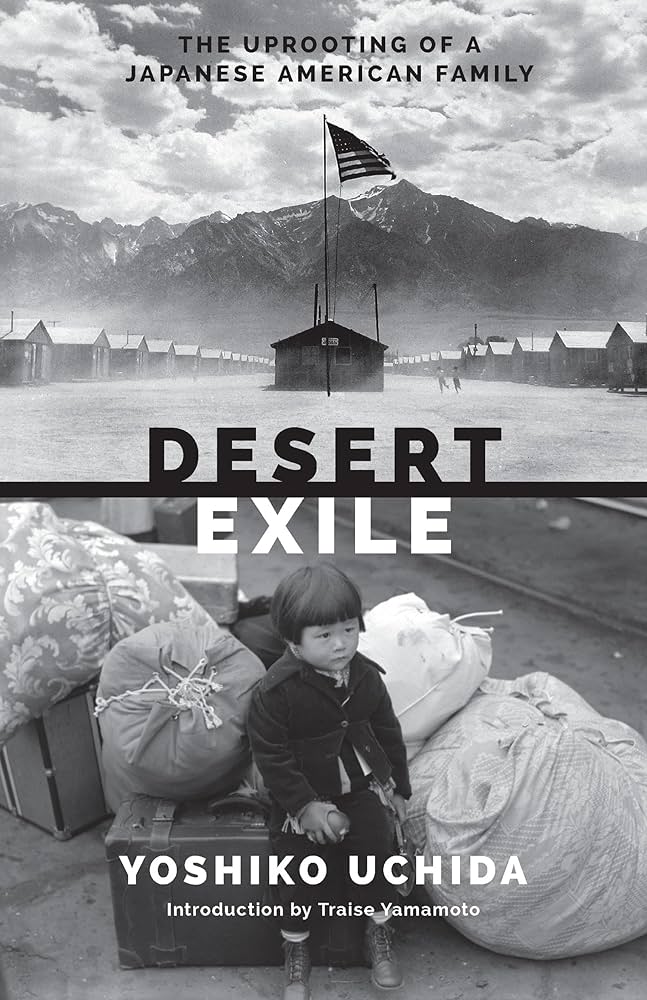What’s it about?
Desert Exile: The Uprooting of a Japanese American Family is Yoshiko Uchida’s moving memoir of her family’s forced removal and incarceration during World War II. Written with honesty and clarity, it provides a first-hand account of the humiliation, loss, and resilience experienced by Japanese Americans when Executive Order 9066 sent them into desert camps far from their homes.
Detailed Summary
Uchida begins with the life of her family in Berkeley, California. Her parents were immigrants from Japan, raising their children with values of education, respect, and hard work. The family lived modestly but happily, deeply tied to their community. This stability was shattered in December 1941, after the attack on Pearl Harbor. Overnight, Japanese Americans were cast as potential traitors, suspected of disloyalty despite generations of contributions to American society.
Uchida describes the fear and uncertainty that gripped her family as the FBI arrested community leaders, searched homes, and spread suspicion. Soon after, her family—along with thousands of others—was ordered to leave their homes and report to assembly centers with only what they could carry. Uchida recalls the heartbreak of abandoning cherished belongings, family pets, and the life they had built.
They were first sent to Tanforan Racetrack in San Bruno, California, where horse stalls and barracks became their temporary homes. The conditions were degrading: overcrowding, poor sanitation, inadequate medical care, and constant surveillance. Despite this, families tried to create some sense of dignity—cleaning their spaces, forming schools, and finding ways to survive.
Later, the Uchidas were relocated to Topaz War Relocation Center in the Utah desert. Here, Yoshiko captures the bleakness of desert life—harsh climate, dust storms, and isolation—but also the resilience of the Japanese-American community. Families planted gardens, built furniture, created art, and held cultural events to maintain their identity. Her family, like many others, clung to education and community spirit as a way of resisting dehumanization.
Throughout the memoir, Uchida reflects on the racism and injustice of incarceration. Japanese Americans were stripped of civil rights, confined without trial, and treated as enemies in their own country. Yet, she also shares moments of kindness, solidarity, and endurance that defined her family’s survival.
Major Themes
- Racism and Injustice: Japanese Americans were punished for their ancestry, not for any crime. Uchida highlights the deep wound of being treated as outsiders in the land of their birth.
- Family Resilience: Despite hardship, the Uchida family maintained dignity, love, and unity, showing the strength of familial bonds under oppression.
- Loss and Adaptation: The memoir captures the pain of losing homes and freedom, but also the human ability to adapt and create life even in a desert camp.
- Memory and Witness: By writing her story, Uchida preserves the memory of injustice and ensures that history is not forgotten.
My Take
Reading Desert Exile is sobering. It reminds me how fragile civil liberties can be in times of fear and war, and how easily racism can strip people of dignity. Uchida’s clear voice makes the injustice personal—it is not just statistics or history, but the story of real families whose lives were uprooted. What stayed with me most was not just the pain of incarceration, but also the quiet resilience of people who refused to lose their humanity.
Memorable Quotes
- “We were not prisoners of war. We were prisoners of our own government.”
- “The dust was everywhere—on our clothes, in our food, and in our lungs. The desert became a constant reminder of exile.”
- “Even in the face of humiliation, my parents reminded us to stand with dignity.”
